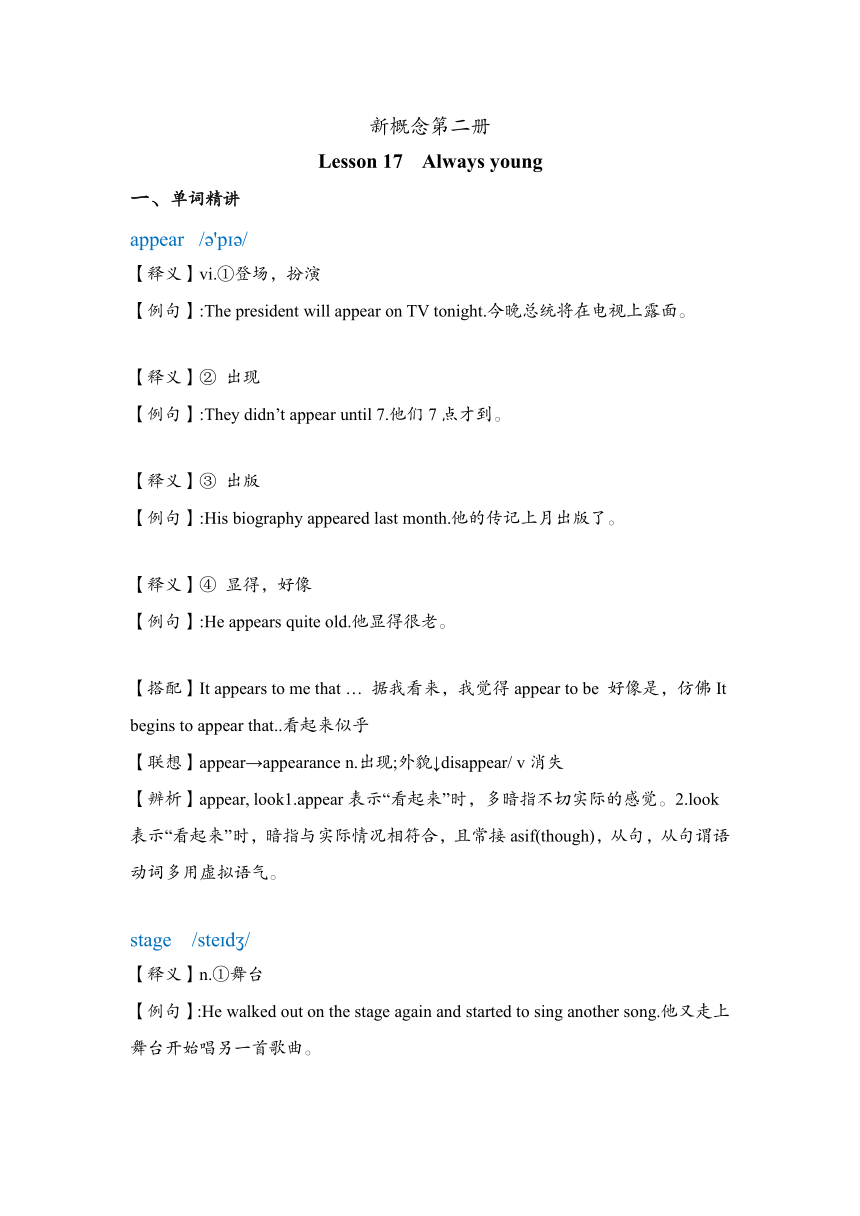
新概念第二册 Lesson 17 Always young 一、单词精讲 appear / 'p / 【释义】vi.①登场,扮演 【例句】:The president will appear on TV tonight.今晚总统将在电视上露面。 【释义】② 出现 【例句】:They didn’t appear until 7.他们7点才到。 【释义】③ 出版 【例句】:His biography appeared last month.他的传记上月出版了。 【释义】④ 显得,好像 【例句】:He appears quite old.他显得很老。 【搭配】It appears to me that … 据我看来,我觉得appear to be 好像是,仿佛 It begins to appear that..看起来似乎 【联想】appear→appearance n.出现;外貌↓disappear/ v消失 【辨析】appear, look1.appear表示“看起来”时,多暗指不切实际的感觉。2.look表示“看起来”时,暗指与实际情况相符合,且常接asif(though),从句,从句谓语动词多用虚拟语气。 stage /ste d / 【释义】n.①舞台 【例句】:He walked out on the stage again and started to sing another song.他又走上舞台开始唱另一首歌曲。 【释义】②时期,阶段 【例句】:The product is at the design stage.产品处于设计阶段。 【释义】③ 步骤,段 【例句】:We did the first stage of the trip by train旅行的第一阶段我们乘火车。 【搭配】early stage 早期,初期stage by stage逐步地 【联想】stay v.停留←stage→steady adj.稳定的 bright /bra t/ 【释义】adj.①鲜艳的 【例句】:I like bright colours.我喜欢鲜艳的色彩。 【释义】②明亮的 【例句】:The light is so bright today that I can’t open my eyes.今天阳光如此明媚,我都睁不开眼睛了。 【释义】③充满希望的 【例句】:The future of these children is very bright.这些孩子们的未来充满希望。 【释义】④ 聪明的 【例句】:The men are very socially awkward but very bright.这些男人不善交际,但很聪明。 【联想】bright→brilliant adj.杰出的 【链接】wise智慧的 stocking /'st ki / 【释义】n.(女用)长筒袜 【例句】:The girl likes to wear stockings in summer.这个女孩夏天喜欢穿长筒袜。 sock /s k/ 【释义】n.①短袜 【例句】:I bought two pairs of blue socks.我买了两双蓝色的短袜。 ② 猛击,重击 【例句】:He gave him a sock on thejaw他朝他的下巴猛击了一拳。 vt. 猛击,狠打 【例句】:She got angry and socked him in the mouth. 她生气了,照着他的嘴巴就是一拳。 【搭配】a pair of socks 一双短袜 【辨析】sock, stocking sock指不到膝盖的短袜子。 2. stocking 长袜,指到膝盖以上的袜子。 重点句型 情态助动词must must译为“必须”,可以表示“必要,命令或强制,邀请,决心,不可推卸的责任”等多处含义。它没有时态和人称变化,通常只用于现在时和将来时。在其他时态时,must的有些含义可以用have to或have got to。这三种形式一般可以互换,但用于第一人称时,have to(have got to)强调客观的要求或外在的原因,must则强调主观的要求或表示说话的人认为自己有权做某事。 must + 原形 = have to 不得不 必须 must, have to 的区别 have to 可以有任意时态 must 只有两种时态 : 现在时 将来时 在过去时的句子中 , 要用 have to 来表示 必须 have to 可以被 have got to 取代 have to 作为实义动词 , 否定式为 don't have to will not have to, didn't have to have to和have got to往往可以互换,但与always,sometimes等频度副词连用时,用have to往往比用havt got to好。have got to比have to更口语化。在过去时的句子中, 要用have to 来表示 “必须”,have to可以有任意时态have to作为实义动词, 否定式为don't have to;will not have to;didn ... ...
~~ 您好,已阅读到文档的结尾了 ~~